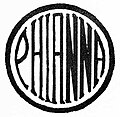Phianna was an American luxury automobile manufactured from 1916 to 1922, first in Newark, New Jersey and then Long Island City, New York.[1]
 The Foreign Car Made in America then America's Representative Among the World's Finest Cars | |
| Formerly | SGV Company |
|---|---|
| Industry | Automotive |
| Founded | 1916 |
| Founder | R. J. Metzler, M. H. Carpenter |
| Defunct | 1922 |
| Fate | ceased operations |
| Headquarters | Newark, New Jersey Long Island City, New York, |
Key people | R. J. Metzler, M. H. Carpenter, |
| Products | Automobiles |
Production output | less than 300 (1916-1922) |

History
editPhianna Motors Company
editThe Phianna Motors Company was created in 1916 by R. J. Metzler. Metzler had acquired the SGV's equipment and production line in May 1915 prior to the company being wound up. SGV had fallen deeply into debt.[2] Metzler partnered with industrialists John A. Bell and T. M. Pepperday, who moved production from Reading to Newark, New Jersey.[3][4][5] The name Phianna originated from one of the companies twin daughters, Phyllis and Anna.[5][6]
Phianna made one car based on the SGV, before changing to it own models.[5] The 1916 Phianna was a $3,600 town car. The bodies were custom-built and chassis were available for coachwork.[7] By 1917 Phianna's ranged in price from $5,000 to $6,000, equivalent to $142,691 in 2023.
M. H. Carpenter Company
editWith the United States entry into World War I, in 1918 the Phianna factory was used to make tools and dies for the Wright-Martin Aircraft Company. The Phianna company put its assets up for sale and Miles Harold Carpenter, an automobile enthusiast who had purchased a Phianna, with assistance from a Texas rancher, Carl M Worsham, acquired the assets. A new plant was set up at the end of 59th Street, Long Island City.[5]
Miles Carpenter was an automotive designer who had worked for Pierce Arrow and Chalmers among others in a varied career. The Phianna was hand-built including its four-cylinder engine of polished aluminum and a wooden cooling fan designed by Fred Charavey. An update version on a 125-inch wheelbase and a new radiator design changing from the Brewster style oval to a more popular Rolls-Royce style was ready for the 1919 auto shows.[5] The Phianna was a prestige car, prices ranging from $6,000 for a standard brougham, to $9,500 (equivalent to $166,952 in 2023) for a special touring car, to $11,500 for a limousine.[1]
Innovative safety glass was introduced in 1919 as were turn signals and stop lights.[5] Carpenter changed the company's motto from The Foreign Car Made in America to America's Representative Among the World's Finest Cars. The company also introduced an innovative six-cylinder engine in 1919 that saw limited production.[5] Phianna could list owners such as the King of Spain, the President of Brazil and Bainbridge Colby, Secretary of State.[1]
Miles Carpenter built Phiannas for Glenn Curtiss using the OX-5 engine with a view to setting up a Curtiss car company. With the depression of 1921 Carpenter, on advice from Mortimer L. Schiff, decided to stop production and close down the business. The final car was made in 1922 for John F Norman.[5]
Gallery
edit-
1919 Phianna Town Car - New York Auto Show display - Motor Life magazine
-
1920 Phianna Coupe from brochure illustrated by Ray Wilcox
-
1920 Phianna Town Car from brochure illustrated by Ray Wilcox
References
edit- ^ a b c Kimes, Beverly Rae; Clark Jr., Henry Austin (1996). Standard Catalog of American Cars 1805-1942 (3rd ed.). Krause Publications. ISBN 978-0-87341-428-9.
- ^ "Final claims in SGV case". Reading Times. April 29, 1916. p. 7. Retrieved June 16, 2015 – via Newspapers.com.
- ^ The World guide to automobile manufacturers, Nick Baldwin, Facts on File Publications, 1987, page 440, ISBN 0816018448, 9780816018444
- ^ The New encyclopedia of motorcars, 1885 to the present, G N Georgano and Thorkil Ry Andersen, Dutton, 1982, page 489, ISBN 0525932542, 9780525932543
- ^ a b c d e f g h Porter, Frank N. (1 June 1962). "PHIANNA: Darling Of The Titans". www.coachbuilt.com. Retrieved 17 June 2015.
- ^ "1912 SGV Runabout". www.trombinoscar.com. Retrieved 17 June 2015.
- ^ "Phianna Advertisement". The New York Times. October 11, 1916. p. 12. Retrieved June 17, 2015 – via Newspapers.com.